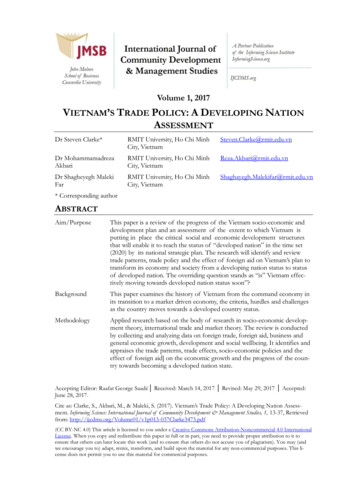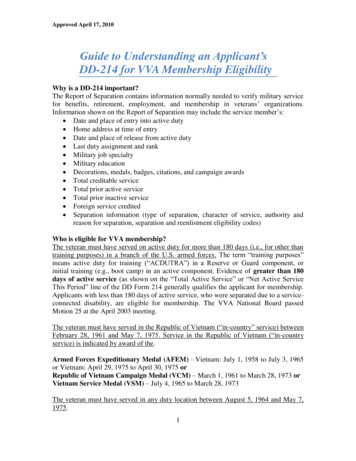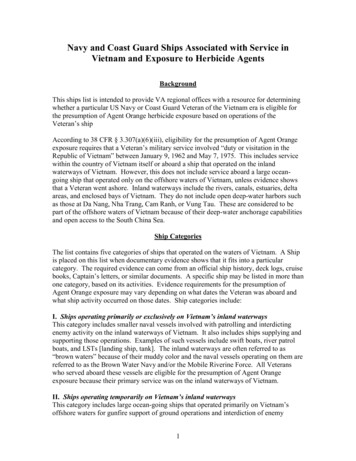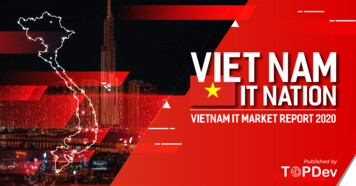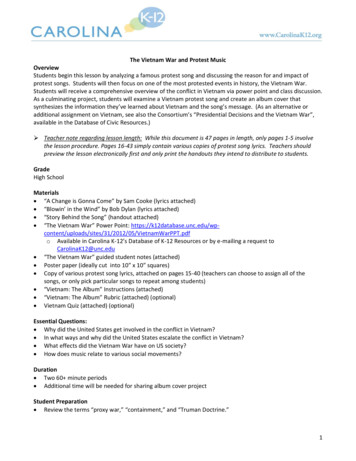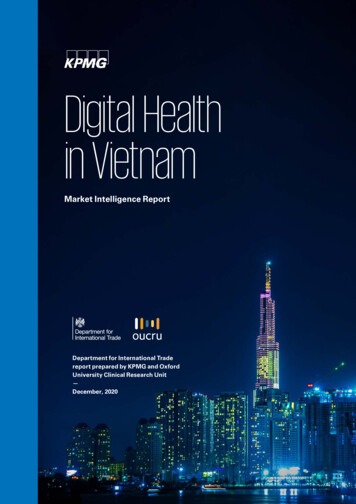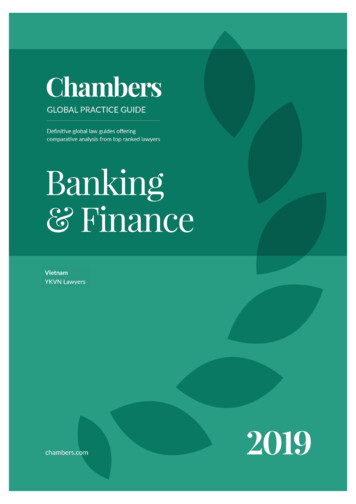
Transcription
VIETNAMLAW AND PRACTICE:p.3Contributed by YKVN LawyersThe ‘Law & Practice’ sections provide easily accessible informationon navigating the legal system when conducting business in thejurisdiction. Leading lawyers explain local law and practice at keytransactional stages and for crucial aspects of doing business.
Law and Practice VIETNAMLaw and PracticeContributed by YKVN LawyersContents1. Loan Market Panorama1.1 Impact of Regulatory Environment andEconomic Cycles1.2 The High-yield Market1.3 Alternative Credit Providers1.4 Banking and Finance Techniques1.5 Legal, Tax, Regulatory or Other Developmentsp.42. Authorisation2.1 Authorisation to Provide Financing to aCompanyp.53. Structuring and Documentation Considerations3.1 Restrictions on Foreign Lenders GrantingLoans3.2 Restrictions on Granting Security to ForeignLenders3.3 Restrictions and Controls on ForeignCurrency Exchange3.4 Restrictions on the Borrower’s Use of Proceeds3.5 Agent and Trust Concepts3.6 Loan Transfer Mechanisms3.7 Debt Buy-back3.8 Public Acquisition Financep.64. Tax4.1 Withholding Tax4.2 Other Taxes, Duties, Charges or TaxConsiderations4.3 Usury Lawsp.8p.85. Guarantees and Security5.1 Assets and Forms of Security5.2 Floating Charges or Other Universal orSimilar Security Interests5.3 Downstream, Upstream and Cross-streamGuarantees5.4 Restrictions on Target5.5 Other Restrictions5.6 Release of Typical Forms of Security5.7 Rules Governing the Priority of CompetingSecurity 7p.7p.7p.8p.8p.96. Enforcementp.106.1 Enforcement of Collateral by Secured Lenders p.106.2 Foreign Law and Jurisdictionp.106.3 A Judgment Given by a Foreign Courtp.106.4 A Foreign Lender’s Ability to Enforce ItsRightsp.117. Bankruptcy and Insolvency7.1 Company Rescue or ReorganisationProcedures Outside of Insolvency7.2 Impact of Insolvency Processes7.4 Concept of Equitable Subordination7.5 Risk Areas for Lendersp.118. Project Finance8.1 Introduction to Project Finance8.2 Overview of Public-Private PartnershipTransactions8.3 Government Approvals, Taxes, Fees or OtherCharges8.4 The Responsible Government Body8.5 The Main Issues When Structuring Deals8.6 Typical Financing Sources and Structures forProject Financings8.7 The Acquisition and Export of NaturalResources8.8 Environmental, Health and Safety Lawsp.13p.139. Islamic Finance9.1 The Development of Islamic Finance9.2 Regulatory and Tax Framework9.3 Main Shari’a-compliant Products9.4 Claims of Sukuk Holders in Insolvency orRestructuring Proceedings9.5 Recent Notable .15p.16p.16p.16p.16p.16p.9p.9p.9p.10p.103
VIETNAM Law and PracticeYKVN LLC has a highly regarded Banking and Financegroup, having served as counsel in connection with someof the largest project finance transactions occurring in recent years, across a range of sectors including electricity,power, cement, petroleum and mining. With more than 90legal professionals in offices in Hanoi, Ho Chi Minh Cityand Singapore, YKVN provides legal services that combineVietnamese and international experience with executioncapabilities and resources in the home market that matchthose of international and major regional firms. The firmhas been involved in many of the most complex, groundbreaking and high value transactions in Vietnam. The firm’slawyers are very experienced in representing lenders andborrowers in commercial banking matters.AuthorsVu Dzung is a partner of YKVN, based inthe Ho Chi Minh City office. He has lednumerous significant asset financingtransactions, especially aircraft financings,project financings and, in particular,infrastructure financings. His practicefocuses on banking and finance, capital markets andcorporate matters. He has been also involved in major debtand equity capital markets transactions onshore andoffshore.Hang Nguyen is a partner of YKVN,based in the Ho Chi Minh City office. Shehas experience advising lending andsecurity transactions in Vietnam as well asbonds issuance transactions of large capcorporations in Vietnam market. Herpractice focuses on private equity, M&A transactions,banking and finance and corporate matters. She hasadvised numerous Fortune 500 companies as well as thebiggest names in Vietnam.Ha Tran is an associate of YKVN, based inthe Ho Chi Minh City office. She has morethan eight years of experience advisingclients, including a range of creditinstitutions, payment intermediaries,securities firms, and other multi-nationalcorporations. Her practice includes banking and finance,corporate matters, M&A transactions and disputeresolution. She has advised many credit institutions inimplementing their new cutting-edge and innovativebanking products in Vietnam.Nam Tran is an associate of YKVN, basedin the Ho Chi Minh City office. He hasmore than six years of experience advisingboth foreign investors and localenterprises in complex transactions andprojects. His practice includes projectfinance, corporate matters, M&A transactions and capitalmarkets. He has been involved in a number of landmarkinternational bond deals in Vietnam.4
Law and Practice VIETNAM1. Loan Market Panorama1.1 Impact of Regulatory Environment andEconomic CyclesAfter a period of strong loan book growth during 2013-17,Vietnam has slowed down. Concerns about aggressive lending practices, and the possible risk in the real estate and nonproduction sectors, have resulted in a tightening of regulations by the State Bank of Vietnam (the “SBV”). The SBValso set a modest target of 14% credit growth for 2019, muchlower than the 18% of the previous years.The slowdown is attributed to the market’s conditions, thegrowing from a larger base, the increasing exposure to realestate loans, as well as the saturation of some of consumerfinance key products such as instalment loans for homeappliances and consumer electronics.Banks traditionally focused on products such as projectfinancing, housing and automobile loans, but in recent yearsthey have expanded into other consumer finance products.Finance companies initially had strong growth, but now facestiff competition from retail banks and new entrants. At thesame time, the players are being constrained with the SBV’stightened supervision, a new set of regulations and lack ofnew products. Instalment products have started to reach saturation, whereas cash loans are facing the SBV’s restrictions.Peer-to-peer lending is a new business model in Vietnamas evidenced by the establishment of several online lendingcompanies, but it still lacks a legal basis. Peer-to-peer lendingwill soon be permitted as part of a pilot program before newlaws are developed for the activity.1.2 The High-yield MarketAccording to the Ho Chi Minh City Real Estate Association, tightening credit policies of bank on real estate lending has resulted in real estate enterprises having desire forproject development seeking alternative sources of finance.Real estate enterprises have recently been issuing bonds athigher interest rates as an alternative source of finance. As aresult, high-yield corporate bonds are becoming an attractive investment instrument. However, such high interestrates are also a sign of imbalances in the issuers’ financingstructure.1.3 Alternative Credit ProvidersBesides the bank loans, Vietnam has witnessed the growthof alternative credit in the securities market, namely, thebonds issuances to both domestic and foreign investors,loans obtained through finance companies, and foreignloans from more and more investors fleeing low or negativeinterest rate jurisdiction.Additional alternative credit providers mean more optionsin the capital mobilisation, thus leading to increased com-petition between such providers and affecting the financingterms and structures such as creditworthy borrowers areable to obtain lower interest rates. New providers bring newideas and technology solutions to the market such as onlinelending.1.4 Banking and Finance TechniquesGiven the development of Industry 4.0, digitalisation hasbeen transforming Vietnam’s banking sector through avariety of initiatives by the Government, credit institutions,technology and others. In terms of product composition,new products include POS instalment products such asloans for home appliances and consumer electronics ande-wallets and other intermediary payment services such asMoMo reaching previously unbanked consumers. Peer-topeer lending is becoming increasingly popular in Vietnamwith the establishment of several online lending companies,but it still lacks a legal basis. Peer-to-peer lending will soonbe permitted as part of a pilot program before new laws aredeveloped for the activity1.5 Legal, Tax, Regulatory or Other DevelopmentsThe SBV launched some tightening of credit in 2018 and2019 by setting credit growth limits (14% compared to 18%in previous years) and controlling lending to high-risk sectors including real estate and security investments. Riskyareas, such as consumer loans or BOT/BT transportationprojects, require commercial banks to maintain their loanportfolio more conservatively. SBV is also considering a pilotprogram for peer-to-peer lending to facilitate the financialinclusion goals while minimising its potential risks. As aresult, growths in 2019 are considered to be slow and steady,following government directions of policies.In 2019, the SBV released two new drafts for amendment ofCircular No. 39/2016/TT-NHNN and Circular No. 43/2016/TT-NHNN, regulating the lending activities of banks andnon-banks, respectively. In these drafts, the SBV is considering taking a stronger stance in managing the risks andimpact from lending activities. In light of slower creditgrowth, profitability ratios have been decreased while prudential ratios such as NPL have been increased slightly forthe sector as a whole.Undercapitalisation has continued to be a pressing issue tothe banking sector as the Basel II compliance deadline of2020 is just six months away. Currently, only nine out of 45banks have officially been given approvals from the SBV toapply Basel II Standards. Basel II Standards maintain thecapital adequacy ratio of at least 8% but changes the calculating method. Specifically, total capital is unchanged, however,the calculation of risk weighted assets has been changed withthe introduction of credit risk and operational risk in theBasel II Standards, which are measured via a variety of methods. The goal is to ensure that all risks are clearly reflected inthe formula of capital adequacy ratio calculation.5
VIETNAM Law and Practice2. Authorisation2.1 Authorisation to Provide Financing to aCompanyVietnamese credit institutions include banks, non-bankcredit institutions, micro-finance institutions and people’scredit funds. Non-bank credit institutions include financecompanies, finance-leasing companies and other non-bankcredit institutions. Under the banking regulations, only credit institutions are allowed to provide financing to Vietnameseorganisations and individuals. In particular: A bank is authorised to provide financing to a companyor an individual in Vietnam. In order to do so, it mustobtain, from the SBV, the approval-in-principle and theestablishment and operation licence, and from the provincial Department of Planning and Investment obtainthe enterprise registration certificate. Notably, there areseveral conditions and requirements under bankingregulations applicable to, among others, the bank, owner/shareholders of the bank and key personnel. A non-bank credit institution in Vietnam is not allowedto provide financing to Vietnamese organisations. Onlyindividuals can obtain financing from a non-bank creditinstitution in Vietnam. As for other organisations which are not credit institutions, though there are several cases of these organisations providing financing, Vietnamese organisations thatare not licensed to engage in lending activities are notallowed to regularly grant loans. If they fail to complywith these restrictions, their lending activity may beconsidered an illegal act and monetary fines and criminalpenalties may be imposed. In practice, there are somelending transactions made between affiliated Vietnamese companies where no penalties have been imposedand the activities have yet to be challenged by regulatoryauthorities, thus far.3. Structuring and DocumentationConsiderations3.1 Restrictions on Foreign Lenders GrantingLoansForeign loans (ie, loans extended by offshore entities) areclassified depending on their maturity as follows: short termloans (those with a maturity of 12 months or less) and medium/long term loans (those with a maturity of more than 12months).Vietnamese individuals are unable to borrow loans from offshore lenders. Vietnamese law requires “[ ]individuals toborrow and repay foreign loans on the principle of self-borrowing and self-liability for repayment in accordance withGovernment regulations”. To date, there has been no regulation promulgated by the Government of Vietnam allowing6Vietnamese individuals to borrow foreign loans. It appears,from the viewpoint of the regulators, that the Governmentwould be reluctant to permit Vietnamese individuals to borrow from offshore lenders because their failure to repay thedebts will adversely affect the national creditworthiness ofVietnam.Vietnamese law allows foreign lenders to extend foreignloans to companies incorporated in Vietnam subject to certain conditions and requirements, among others: The SBV regulations on foreign loans provide that a company is permitted to borrow foreign loans for implementation of a “business and production plan” or “investmentproject” using foreign loan capital of the borrower or itsinvestee companies or restructuring the foreign loan debtof the borrower without increasing the costs of borrowing. If the borrower obtains medium- or long-term loans forits project and the project is licensed under an investmentcertificate or investment registration certificate (“IRC”),the balance of the foreign loan together with all otheroutstanding medium- and long-term foreign and domestic loans must not exceed the difference between the totalinvestment capital and the equity capital recorded in therelevant IRC. Short-term borrowing is not subject to thislimit. If the borrower’s project does not have an IRC, thebalance of the foreign loan together with all other outstanding medium- and long-term foreign and domesticloans must not exceed the total borrowing needs of theproject, as approved by the competent authority. A medium- or long-term foreign loan must be registeredwith the SBV prior to drawdown and the registration isessentially an approval process. Short-term loans are nothowever subject to the registration requirement. Anychange to the details of the loans recorded in the foreignloan registration certificate issued by the SBV will have tobe re-registered by the borrower with the SBV. The foreign loan must be within Vietnam’s foreigncommercial debt limit, which is approved by the PrimeMinister on an annual basis. There is no specific cap on interest rates of a foreign loan.However, since the foreign loan has to be registered withthe SBV, the SBV may raise question if the interest rateagreed by the borrower and the offshore lender is muchhigher than the common interest rate in Vietnamesemarket.3.2 Restrictions on Granting Security to ForeignLendersVietnamese law permits foreign lenders to take mortgage ofmoveable assets and properties only (eg, equipment, inventory, bank accounts and securities), but it does not allowforeign lenders to take mortgage of land use rights andimmoveable assets located on land. As a matter of commonpractice, a foreign lender may appoint an onshore security
Law and Practice VIETNAMagent to take security over land and immovable assets on itsbehalf in BOT projects based on Official Letter No. 1604/TTg-KTN issued by the Prime Minister on 12 September2011. However, this arrangement is not workable withrespect to other projects.However, it is not clear whether a security agent can holdsecurity on behalf of its principals. In foreign loan transactions, the security interest is normally created in favour of allsecured parties and the security agent is authorised to carryout the administration and the enforcement of the security.There is no restriction on granting of guarantees by a Vietnamese entity in favour of foreign lender in order to secureobligations of a Vietnamese borrower; however, the guarantee must be registered with the SBV together with the registration of foreign loans that are secured by the guarantee.The issue of whether a commercial bank is able to act asa security agent (for onshore lenders or offshore lenders)remains questionable, though in practice, there have been anumber of precedents. There are two reasons for this:3.3 Restrictions and Controls on Foreign CurrencyExchangeForeign exchange control regulations provide that the foreign loan must be made in a foreign currency, save for certain cases such as the borrower being a micro-finance institution; the lender being an investor making direct investment inthe borrower, and the loan is sourced from the dividendsin Vietnamese currency distributed by the borrower tothe foreign lender; or other circumstances as approved by the SBV Governoron a case-by-case basis.The borrower of foreign loans is permitted to purchase foreign currency at an authorised credit institution for the purpose of payment of loan principal, interest and fees.3.4 Restrictions on the Borrower’s Use of ProceedsThe proceeds from foreign loans must be used for permittedpurposes, which include: implementation of business and production plans andinvestment projects of the borrower or its investee companies; and restructuring of current foreign loan(s) of the borrowerwithout increasing the cost of funding.Firstly, as a general principle, any action taken by a commercial bank should be within the scope of business stated in itsestablishment licence. However, acting as a security agent inloan transactions is not expressly stated as one of the business activities in licences of commercial banks.Secondly, creation of security over land use rights or immovable assets in favour of offshore lenders is not legally permissible, and therefore the use of a commercial bank as agent forsecurity over those assets can be considered as circumvention of that prohibition and accordingly, is not valid.3.6 Loan Transfer MechanismsVietnamese law provides the transfer mechanism foronshore loans granted by credit institutions in Vietnam, butnot foreign loans extended by foreign lenders.A foreign loan can be transferred from an existing foreignlender to a new foreign lender if there is no restriction ontransfer of the loan under the loan documents and suchtransfer is permissible under the law of the jurisdiction inwhich the lenders are located. Since the transfer of foreignloan causes a change in lender, the borrower is required toregister such change with the SBV.3.5 Agent and Trust ConceptsCircular No. 09/2015/TT-NHNN, which regulates debtpurchases and sales by local credit institutions and foreignbank branches, allows a local credit institution or a foreignbank branch to sell its loans to either a Vietnamese or anoffshore debt purchaser and such sale of loans is generallynot subject to any approval of or prior notification to theSBV. As a general rule, under Article 370 of the Civil Codea transfer of loan requires the consent of the borrower if thelender has obligations under the loan agreements (such askeeping clients’ information confidential or notifying clientsof change in lending interests or fees, etc). In the absenceof such consent, the transfer may become voidable. In casethere is no such obligation by lender to the borrower, it isnot required to obtain their consent; instead, a notificationshall be made by the lender to the borrower.Agency arrangement is not a well-developed concept in Vietnam, although it is recognised in the Civil Code and regulations on syndicated loans of credit institutions in Vietnam.According to Article 368 of Civil Code and Articles 14 and17 of Circular 09, the debt purchaser will assume all of therights and obligations of the bank relating to the transferred loan including, but not limited to, those relating toIn Vietnam, corporate bonds are typical debt securities.Bonds can be issued by a company privately or publicly andon the domestic market or international market. A companycan use the proceeds from privately issued bonds to implement its investment programs and projects and increaseworking capital or to refinance the company’s debts. Thereis no restriction relating to the use of proceeds from bondswhich are publicly issued on either the domestic market orthe international market.The concept of “trust” is generally not recognised.7
VIETNAM Law and Practicethe security attached to a loan. In case the security is registered with security registration authority/agency, the registration should be amended to update the new lender asthe new secured party without compromising the priorityof the security.3.7 Debt Buy-backCircular No. 09/2015/TT-NHNN only regulates the saleof debts arising from the extension of loans by local creditinstitutions and foreign bank branches pursuant to whicha local credit institution or a foreign bank branch may sellits loans to either a Vietnamese or an offshore individual,and organisations which may include borrower and sponsor.Since Circular No. 09/2015/TT-NHNN does not prohibit aborrower to buy-back debt, the borrower or sponsor maybe permitted to buy-back debt if there is no such restrictionunder a loan agreement.In case of foreign loans, it appears that the Vietnameseborrower and Vietnamese sponsor are unable to buy-backdebt. Since the buy-back of foreign loan causes a change inlender and the foreign loan becoming the local loan whichmust be denominated in Vietnamese Dong, the borrower isrequired to register any changes with the SBV. The SBV maynot accept the registering of changes because the buy-backof foreign loans is not provided elsewhere under Vietnameselaw. With regard to the debt buy-back by a foreign sponsor,it is a matter of law of the jurisdiction in which the lenderand foreign sponsor are located rather than a matter of Vietnamese law.3.8 Public Acquisition FinanceVietnamese law does not explicitly provide a “certain funds”requirement, however, an offeror in a public acquisition of apart or all of the voting shares of a Vietnamese public company for the purpose of taking control of the public company(a “public tender offer”) must ensure fair chance for sale byall shareholders of the public company.In order to implement a public tender offer, the offeror mustsubmit an application to register the public tender offer withthe State Securities Commission (the “SSC”) and the application must include, among others, audited financial statements of the preceding year and other documents certifyingfinancial capability in accordance with specialised laws, orconfirmation on financial capability of the offeror. In addition, a securities company acting as agent for public tenderoffer must ensure that the offeror has sufficient funds tomake the offer.After the SSC registers the public tender offer, the offeror willmake a public announcement of the public tender offer tothe media and implement it. Upon completion of the publictender offer, if the offeror holds at least 80% of total outstanding voting shares of public company, the offeror mustcontinue to purchase the remaining shares within 30 days,8on prices and payments terms similar to those applicable inthe public tender offer. In case the public company is a listedcompany, a public tender offer may reduce the pool of publicshareholders of the listed company such that it no longersatisfies the public float. In this case, the listed company willbe subject to delisting procedures.Whether transactions have “certain funds” or financialcapability provisions in the documentation depend on thetransacting parties and whether short or long form documentation is to be used will normally depend on the creditrequirements of the relevant lenders. Documents evidencingthat the offeror complies with financial capability requirement will be submitted to the SSC and provided to the securities company, but not publicly disclosed.4. Tax4.1 Withholding TaxA withholding tax of 5% corporate income tax (CIT) shallapply to interest accrued on loans granted by foreign entities.Foreign loans provided by certain governments or semi-government institutions may obtain an exemption from interestwithholding tax where a relevant double taxation agreementor inter-governmental agreement applies.4.2 Other Taxes, Duties, Charges or TaxConsiderationsOther than the withholding tax, there are no taxes or dutiesapplicable to foreign lenders making loans to local borrowers.4.3 Usury LawsThere is no specific cap on interest rates of a foreign loan.However, since the foreign loan has to be registered with theSBV, the SBV may raise a question if the interest rate agreedby the borrower and the offshore lender is much higher thanthe common interest rate in the Vietnamese market.5. Guarantees and Security5.1 Assets and Forms of SecuritySecurity customary for project financing in Vietnam typically includes: security over project assets of the project company whichmay include land use rights and assets attached to land(such as plants and buildings) and movable assets (suchas equipment, machinery, receivables, bank accounts,contractual rights, and proceeds from investments); security over equity interests of shareholders in the project company; and
Law and Practice VIETNAM in certain circumstances, guarantee issued by, and/orsecurity over other assets of, the intermediary or ultimateowners of the project.security and each kind of secured assets. Therefore, a security interest over an individual type of asset is usually takenrather than a universal security interest.Security under Vietnamese law comprises pledges, mortgages, security deposits, performance bonds, escrow deposits,title retentions, guarantees, fidelity guarantees and liens onproperty. In project finance, mortgage is the most commonform of security granted over property in Vietnam wherebythe securing party can retain possession over the property.5.3 Downstream, Upstream and Cross-streamGuaranteesWith respect to moveable assets, property rights and equityinterest, the security interest will be effective as from theexecution date of the security agreement, unless otherwiseagreed by the parties, and registration of the security is onlyto ensure the priority (based on time of registration) andenforceability against any third party in the event of enforcement. The registration can be made at the local Centre forRegistration of Transactions and Assets under the NationalRegistration Agency for Secured Transactions under theMinistry of Justice of Vietnam (the “NRAST”). Registeredsecurity shall have priority over unregistered security. Priority payment among unregistered security is based on thedate of creation of the security.With respect to immovable assets (such as land use rights andassets attached to land), the security agreements are requiredto be notarised by competent notary office and registeredwith the Land Use Right Registration Office under the provincial Department of Natural Resources and Environment(the “DONRE”). A security over immovable assets shall takeeffect as from the DONRE registration and recorded in thetitle document such as a certificate of land use right, houseownership and other assets attached on land.5.2 Floating Charges or Other Universal or SimilarSecurity InterestsThe concept of floating charges does not exist in Vietnam.Nonetheless, Vietnamese laws allow mortgage over “property being goods rotating during the production and business process” which may be similar to the concept of floatingcharge. Examples of properties include machinery, equipment, raw materials, fuel, or other inventory which can besold, replaced or exchanged by the mortgagor at any timeprior to occurrence of an event of default. In this case, therights to demand the purchaser to pay money, the rightsto receive proceeds, the assets formed from the proceedsreceived or the substituted or exchanged assets shall be thesecured assets. In case inventory is the secured asset, themortgagor may replace goods in the warehouse but mustmaintain the value of inventory as agreed by the mortgagorand the mortgagee.A single security interest over the whole business and assetsof a company is not a market practice in Vietnam as Vietnamese law provides different regulations on each kind ofGenerally, Vietnamese private companies are permitted togrant downstream, upstream and cross-stream guaranteesto guarantee the obligation of Vietnamese individuals andorganisations. Downstream, upstream and cross-streamguarantees may be considered related-party transactions,and thus corporate approvals for these transactions will berequired.In the case of Vietnamese public companies, the grantingof guarantee by the public companies are subject to DecreeNo. 71/2017/ND-CP on providing guidelines on corporategovernance applicable to public companies, which generally prohibits public companies from providing loans andguarantees to: its individual shareholders and related persons of suchshareholders except for the case where the public company is a credit institution; its institutional shareholders and related persons of suchshareholders being individuals, except for certain cases asfollows:(a) where the public company is a credit institution; and(b) where the shareholder is also the public company’ssubsidiary (without shareholding held by the State)and such cross ownership was established before 1July 2015; related persons of shareholders being organisations,except for certain cases as follows:(a) where the public company is a credit institution; a
tions by the State Bank of Vietnam (the "SBV"). The SBV also set a modest target of 14% credit growth for 2019, much lower than the 18% of the previous years. The slowdown is attributed to the market's conditions, the growing from a larger base, the increasing exposure to real estate loans, as well as the saturation of some of consumer
